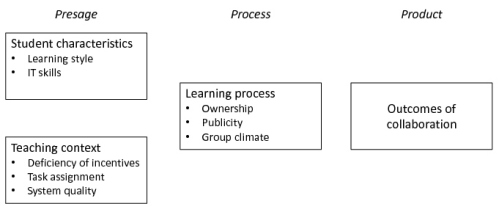Within this blog post, I will introduce another paper that will be part of my doctoral thesis. This paper is, together with my paper about students’ intentions to use wikis, the foundation of my doctoral research. In contrast to my paper about students’ intentions, which used a quantitative approach to identify influences on students’ wiki use, this paper reports qualitative approach. Utilising a systematic literature review, I identified obstacles to collaboration using a qualitative approach to data analysis. In the following, I will:
- provide my paper for download (Open Access) [1],
- give a brief overview of the results, and
- introduce lessons learned from peer review.
A brief overview
From the abstract:
Wikis are attractive tools for supporting collaboration and are widely used in higher education. Nevertheless, a collaborative tool does not necessarily lead to collaborative behaviour. This study addresses this shortcoming by analysing factors influencing the adoption of wiki collaboration in higher education. For this purpose, literature was systematically selected and analysed using a grounded approach to qualitative data analysis. As result, a framework that comprises factors influencing and actions fostering collaboration is presented. This allows instructors to better address obstacles to collaboration.
As a result of this research, I outlined eight factors that influence, or even affect the efficiency of collaboration in wikis. As advocated by Resta & Laferrière [2], I used Biggs’ 3P model [3] to classify the influencing factors.

The category Learning process covers three factors, which are influencing students’ behaviour during wiki work; these factors can be targeted by tutoring processes and are therefore not in lecturer’s direct control.
Although a lack of IT skills and System quality were often named as a problem, most studies concluded that IT skills can be achieved by students easily and system performance is not a major problem. Additionally, incentives can be easily provided by the lecturer, at least incentives that target students’ extrinsic motivation.
After all, Task assignment gives the lecturer the greatest freedom of design and is therefore the best starting point for lecturers who want to facilitate wiki collaboration before the class have started. Although this finding seems obvious for an educator, this implication bestowed me a light-bulb moment and had several consequences for my further doctoral research. Having a degree in management information systems, I hoped to find more technical parameters that can be used to facilitate collaboration, but ultimately I engaged in educational theory in order to foster collaboration. As outlined above, findings from this research were the foundation for my doctoral research. Specifically, my doctoral thesis will include a paper about an action research project, wherein I developed an educational setting that facilitates collaboration.
Lessons learned from peer review
You can learn a lot from good peer reviews – and sometimes also from bad ones. As this was one of my first papers, I was pretty new to the academic circus of peer review. I have learned the following things:
- Before submission, count the number of your sources that appeared in the journal you are submitting to; from the review: “Also, you often cited other technology journals, but only cited one source from our journal. You may want to consider submitting to a journal that you cited most often in your paper.”
- Scrutinise the contribution of your paper, especially when it is a literature review; from the review: “you have done a systematic review of existing studies, the categories are themselves very familiar and do not offer us any more than a clear and useful summary of the studies.” In combination with my experiences as a reviewer, I can conclude that a submission is more likely to be accepted rather it introduces an uncommon or novel approach than an useful paper (for novices within the field.
Meanwhile, I refrained from submitting this paper to a journal again, as the expiration date of the literature review has arrived – the data collection took place in November 2011. However, I made this paper publicly available at SSRN (Open Access) to provide other researchers with a useful resource.
References
- Kummer, C. (2013). Factors influencing wiki collaboration in higher education. doi:10.2139/ssrn.2208522 (Open Access)
- Resta, P., & Laferrière, T. (2007). Technology in Support of Collaborative Learning. Educational Psychology Review, 19(1), 65–83. doi:10.1007/s10648-007-9042-7
- Biggs, J. (1989). Approaches to the enhancement of tertiary teaching. Higher Education Research & Development, 8(1), 7–25. doi:10.1080/0729436890080102